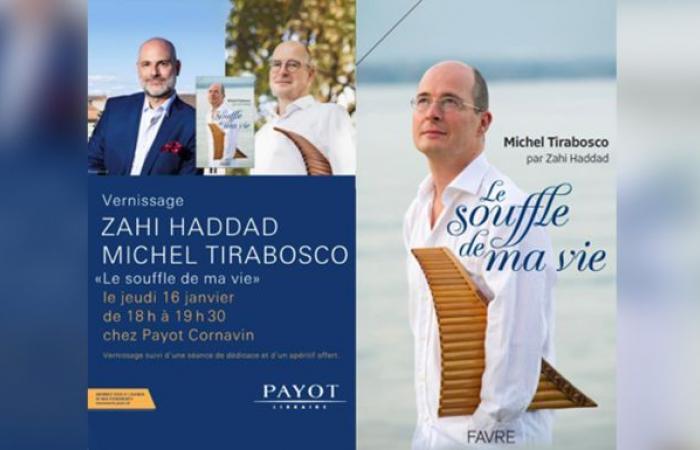The Breath of my lifea biography written by Zahi Haddad, traces the life of flautist Michel Tirabosco, between disability, remarkable international career and unforgettable artistic encounters. For the release of the work, Zahi Haddad and Michel Tirabosco discuss, for Ici Beirut, the creative process.
On January 14, 2025, the biography of Michel Tirabosco will be published by Favre, The Breath of my life, by Zahi Haddad, writer and biographer, whose work accompanies individual stories and revolves around themes such as living together, diversity and authenticity. Two launches are planned in Switzerland: January 16 at 6 p.m. at Payot Cornavin and February 11 at 6 p.m. in the Collonge-Bellerive company hall.
Suffering from a congenital malformation, Michel Tirabosco was born with two atrophied arms. An internationally renowned flautist, with around fifteen albums to his credit, the artist testifies to his experiences in this work: his youth, his vocation for music, in particular the transverse flute and the pan flute, his handicap situation as well as as his exceptional career as a soloist, marked by a world tour with André Rieu. His journey is a true lesson in courage, a human and spiritual quest, all in music, since the book is punctuated with references to popular songs or classic tunes, to be listened to to prolong the sharing with the artist.
On the occasion of the publication of the work, Zahi Haddad and Michel Tirabosco share with Ici Beirut their respective reflections and the links they have forged through this work.
Questions to Zahi Haddad
Have your writings evolved over time?
In my professional career, writing has always occupied a central place, whether in the press, communication or my activities linked to the Geneva market. As a child, I liked to isolate myself to tell or write stories. A few years ago, I left everything to devote myself entirely to writing. Madness, some will say, but for me, it was the certainty of seeking my fulfillment. Time has proven me right, as have all the people, public institutions and private companies who support my approach, trust me and adhere to my work.
Living together, diversity and authenticity are themes around which your work revolves. Do you choose your subjects, do they come to you or do you rely on crossroads?
These themes are at the heart of my work and I approach them from different angles: the international dimension of Geneva with 126 Heartbeats for International Genevamigration through several books of portraits, or even disability with Disability, everyday lifeco-written with Paralympic champion Céline van Till, double silver medalist at the Paris Olympics and the subsequent World Championships. Biographies, for their part, particularly fascinate me, because they reflect a part of our humanity and our common heritage. All these meetings thrill me, especially since the question of “live together” is of major societal importance.
What artistic or human aspect of Michel Tirabosco struck you the most during your research or your dialogues?
I had heard of Michel's talent, but I didn't know that he gave concerts all over the world. With this biography, I discovered that he is an accomplished and widely acclaimed musician. Meeting Michel is like receiving a breath of fresh air. He knows how to stay positive, pursue his dreams and perceive the beauty of our world. Above all, he knows how to experience this beauty, in particular thanks to an exceptional connection with nature and the people around him. Through his contact, I learned a lot about myself.
Questions to Michel Tirabosco
Why did you choose Zahi Haddad as a writer and biographer?
Zahi and I live in the same neighborhood. One day, chance brought us together. I can say that we immediately established a very friendly and sympathetic relationship. At the time, Zahi was working on a book project chronicling the daily lives of people with disabilities. It was quite natural that he asked me to participate in this book. Later, he gave me his work To Yaya's happinessin which he talks about his Lebanese origins. I really appreciated this story and especially its great sensitivity. His writing style is fluid, effective and full of kindness.
Furthermore, I have a special relationship with Lebanon. I went there for the first time with my whole family to play at a wonderful festival near Beirut. Subsequently, I returned there several times, notably after getting to know the Order of Malta. Together we recorded works for pan flute, choir and accompaniment, which were performed on the feast of Saint-Jean-Baptiste in a large church in Beirut. Thanks to Zahi's book, I revived these precious memories of Lebanon, which I perceived as a sign from the universe.
Were you involved in writing the biography?
We are met frequently, we thought and discussed at length. For five months, Zahi did considerable work to gather the necessary elements, then to write. I am deeply grateful to him, because the end result far exceeds my expectations. Zahi knew how to place himself as close as possible to my thoughts and my sensitivity.
What did you want to share with the public?
The goal was certainly not to recount everything I have accomplished in my life. I rather wanted to offer a humble and authentic testimony. Each of us follows a unique life journey. Through my journey as a musician and my disability, I hope to convey a message of hope to readers. Everything is possible in life, and we all deserve to experience beautiful moments on this earth. I also hope that the pan flute will gain recognition and be more appreciated.






